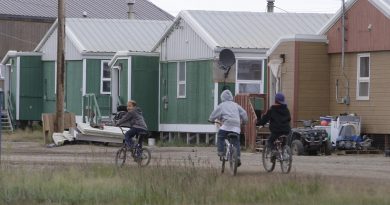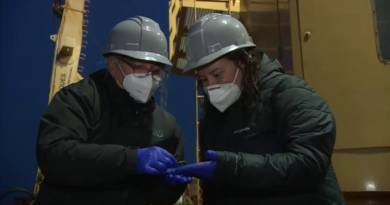Green Party calls on Liberal government to stop seismic testing in Davis Strait
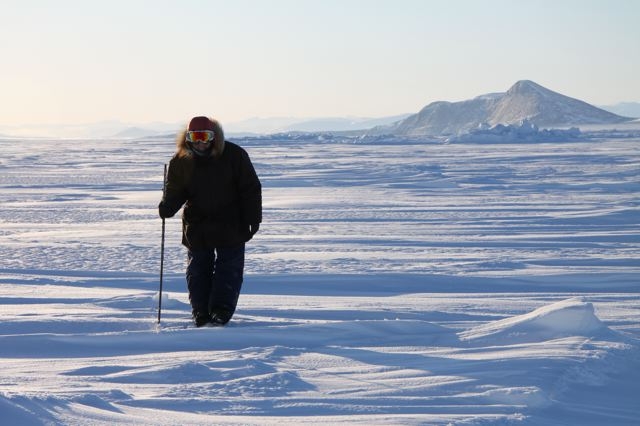
The federal government urgently needs to step in and stop planned seismic testing in Davis Strait regardless whether the Supreme Court of Canada agrees to hear a last-minute appeal by Inuit groups opposed to the project, says Green Party Leader Elizabeth May.
Canada’s highest court is expected to rule on Thursday morning whether it will hear the case brought by the Inuit hamlet of Clyde River in Nunavut and the local hunters and trappers organization against Petroleum Geo-Services Inc. (PGS), Multi Klient Invest (MKI), TGS-NOPEC Geophysical Company ASA (TGS) and the Attorney General of Canada.
The residents of Clyde River, an Inuit settlement on the northeastern coast of Baffin Island, want the Supreme Court to revoke the permit granted to PGS, MKI and TGS by the National Energy Board (NEB) in June of 2014 to conduct a seismic testing project to detect and measure the presence of petroleum and natural gas deposits in Baffin Bay and Davis Strait.
They argue they have never been properly consulted about the proposed seismic survey which would involve “detonating air guns that are 100,000 time louder than a jet engine for 24 hours a day for five months per year for a period of five years.”
‘Question of indigenous rights’
“This is a question of indigenous rights, the Inuit people who live in Clyde River strongly oppose this project and yet the federal government essentially abdicated its responsibility to indigenous peoples by allowing the National Energy Board to make the decision without adequate federal engagement with the indigenous peoples of the area, the Inuit,” May said in an interview with Eye on the Arctic.
(listen to the full interview with Green Party Leader Elizabeth May)
The other question that the Green Party wants the Liberals to look at is the environmental damage done by seismic surveys, May said.
Concerns for marine mammals
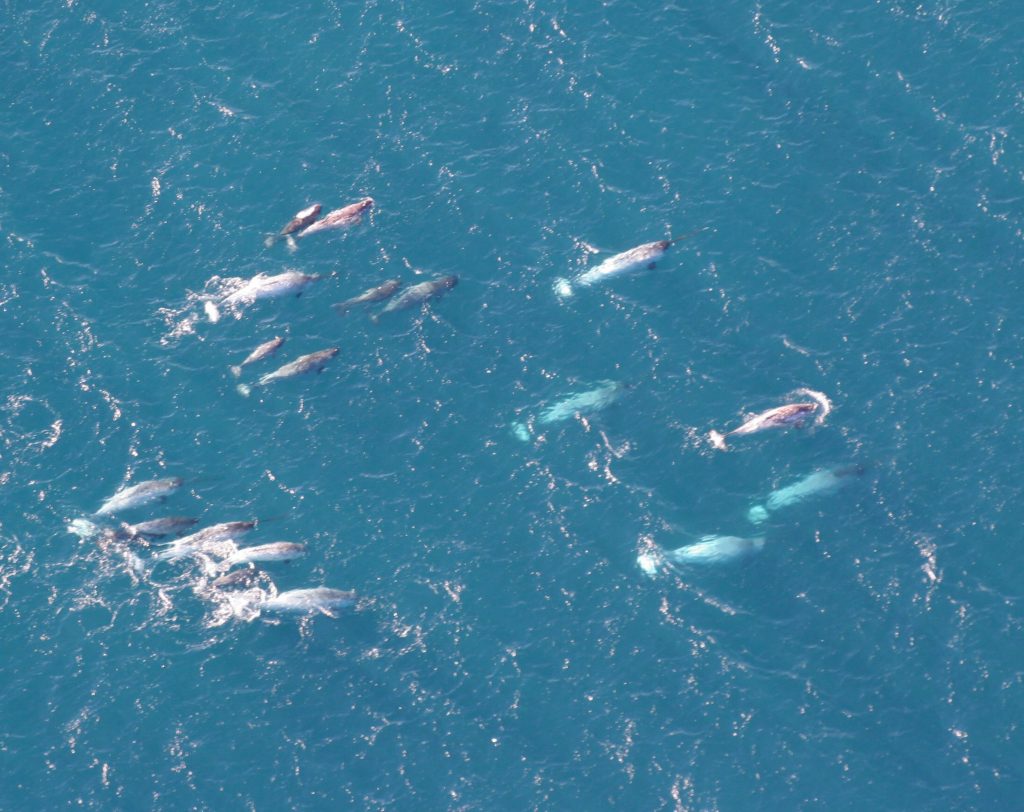
Linda Weilgart, an adjunct professor of marine biology at Dalhousie University in Halifax and an expert on bioacoustics, who provided affidavit testimony for the application by Clyde River residents, said she has serious concerns about the impact of the noise from the seismic survey on the marine life in Baffin Bay.
The deafening sound from the survey can travel very far, she said.
“You can have areas of hundreds of thousands of square kilometres covered by a single survey,” said Weilgart speaking from Halifax. “So the whole area around Baffin Bay can be just blanketed by sound.”
For example, seismic surveys off Nova Scotia have been heard 3,000 kilometres away in the middle of the Atlantic Ocean, Weilgart said.
“I’m concerned about the displacement from the habitat, stress effects, effects on the prey species, on fish and on invertebrates,” Weilgart said.
Weilgart said there have been studies looking at cases of large pods of narwhal whales getting stuck in winter ice and dying because they avoided migration through areas affected by seismic testing.
“The Arctic is relatively pristine from noise in that it doesn’t have as much shipping and seismic surveys haven’t been as common as in other places,” Weilgart said. “So the species there are not as well adapted to noise and that could cause a greater effect as well.”
‘Irreparable harm’ to Inuit way of life
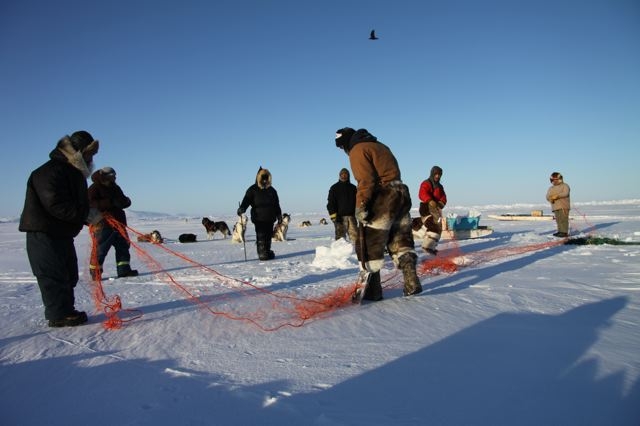
Nader Hasan, the lawyer representing Clyde River residents, said his clients fear “irreparable harm” to their way of life if the migratory patterns of marine mammals are disrupted as a result of seismic testing.
“As they have for thousands of years, the Inuit of Clyde River depend on marine mammals, such as the narwhal, the ringed seal and the bowhead whale, for their food, their economy and their culture,” Hasan wrote in the Memorandum of Fact and Law of the Applicants.
“There are no substitutes. Simply put, at stake in this proceeding is not only the health of the Arctic marine animals and the Arctic ecosystem. Also at stake is the continued survival and centuries-old way of life for an entire people.”
The other major issue in the case is the failure of the federal government to properly consult with the residents of Clyde River, he said.
Ottawa refused to become involved in the process, and refused to require that a strategic environmental assessment be completed prior to the approval, said Hasan.
Instead, the previous Conservative government and the NEB left it to the three companies involved in the seismic testing to consult with the Inuit communities, he said.
However, two lower courts have already ruled that the consultation conducted by the companies met the requirements prescribed by the law and have dismissed the application for judicial review.
Government responsibility
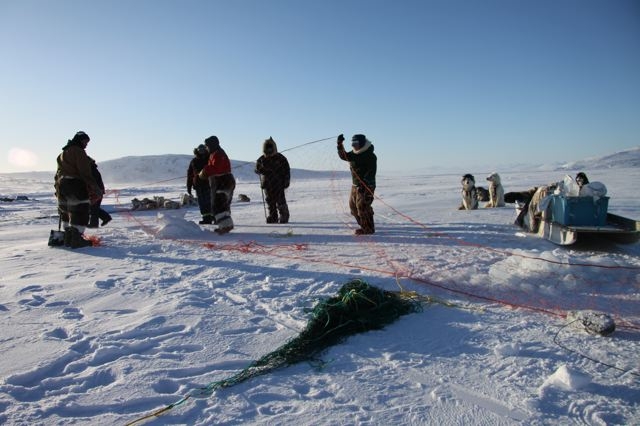
May said she is very hopeful that the new Liberal government will take its responsibility “seriously” and will cancel the permits issued by the NEB and “not allow five years worth of seismic testing to take place in this very sensitive Arctic ecosystem.”
The NEB has consistently turned a deaf ear to the concerns of the indigenous peoples of Canada and to the concerns for the environment, May said.
“They are not the right agency to be looking at environmental impacts,” May said. “They are the wrong agency altogether – and they’ve proven this over and over – to be engaged in legitimate consultation on nation-to-nation basis with indigenous peoples in Canada.”
May said she has raised the issue of seismic testing in Davis Strait with Indigenous and Northern Affairs Minister Carolyn Bennett, asking her to make time to meet with representatives of Clyde River.
“I think the world of Carolyn Bennett,” May said. “In the time that I’ve been involved in public policy, which is decades, I don’t think Canada has ever had a more dedicated minister for indigenous affairs, but this has gone quite far under the previous government.”
Cathy Khoury, a spokesperson for the federal ministry of natural resources, said the government could not comment on the case because it still before the courts.
The companies named in the application were not available for comment either.
Representatives of the government of Greenland, which shares Davis Strait with Canada, also did not respond to requests for comments or interview before this story went into publication.
Related stories from around the North:
Canada: Appeal to start on Arctic seismic testing, Radio Canada Interantional
Finland: Finland last to sign indigenous rights treaty?, Yle News
Sweden: Land, water rights big issues in Sweden’s Sami elections, Radio Sweden
United States: Salmon run’s survival trumps religious rights of Alaska Native fishermen: judge, Alaska Dispatch


